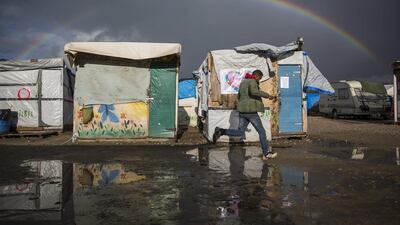PARIS // French authorities say the closure of the slum-like camp in Calais will start on Monday and will last about a week in what they describe as a “humanitarian” operation.
According to officials at France’s interior ministry, all of the 6,486 migrants they have counted in the camp — where refugees have been living in poor conditions for years — will be offered relocation, either in reception centres across the country or abroad.
The dismantling of the camp — known as the Jungle — is a major issue for French president Francois Hollande as his socialist government prepares for next year’s presidential election.
Mr Hollande, is facing harsh criticism from conservative and far-right rivals, who said the camp symbolised his failure to deal with Europe’s migrant crisis.
Interior ministry officials said more than 7,500 places have been made available for the refugees from the camp, and have promised that they will be housed in dignified conditions while their asylum applications are processed. Though the French authorities do not expect opposition from the migrants, they are concerned that activists from the No Borders group, who advocate free movement for all and have staged protests in Calais, will disrupt the dismantling operations.
About 200 activists — most of them French and British — have gathered in Calais and local prefect Fabienne Buccio said 1,250 police officers will be deployed during the closure operations.
On Sunday, leaflets written in languages spoken in the camp will be distributed to migrants, who will gather in a 3,000-square-metres shed adjacent to the camp from Monday morning, where they will be divided into four groups: unaccompanied minors, adults, families, and vulnerable people. Sixty buses, each carrying 50 people, will depart on Monday, meaning 3,000 migrants are expected to leave Calais on the first day of the dismantling operation. Each migrant will be offered two relocation options in France, and packed lunches provided to those setting off on a long road journey.
Volunteers from the aid group France Terre d’Asile will work closely with the 1,291 unaccompanied minors. Most of these teenagers, who claimed to have ties in Britain, will remain in Calais until their requests for family reunification are examined by the British home office.
About 70 minors have legally crossed the English Channel since the start of the year and French authorities said they have received guarantees from their British counterparts that the influx of teenagers will be increased.
The minors staying in France will be dispersed in special centres for teenagers where they will not mingle with adults.
Various squalid settlements have existed for decades around Calais, one of the busiest ports in France and the French end of the Channel Tunnel rail link with Britain. It is also where thousands of lorries drive on to ferries or trains heading for Britain, just 35 kilometres across the water.
In 1999, the Sangatte refugee camp run by the Red Cross was set up to manage the flow of migrants, but this was shut down three years later by then interior minister Nicolas Sarkozy.
The 700 to 800 inhabitants, mainly Afghan migrants, moved to a new location that became known as the “Jungle”.
Hundreds of police demolished this site in September 2009 despite protests by antiglobalisation activists and leftist groups.
From April 2015, a new “Jungle” camp emerged as hundreds of thousands of people headed to Europe from the Middle East and Africa in the continent’s biggest migrant crisis since World War II.
The population of mainly Afghans, Iraqis, Eritreans and Sudanese has peaked at more than 10,000, according to local charities, but in its final days was believed to be around half that number.
* Associated Press

